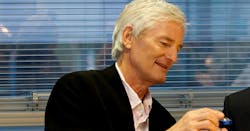Dyson Moves Ahead on $2.6 Billion E-Car Plan with Test Center
Dyson Ltd., best known for its vacuum cleaners and hand dryers, is charging ahead with a 2-billion-pound (US$2.6 billion) push to start building electric cars, unveiling plans to turn a former airfield into a vehicle-testing site.
The technology center at the former Hullavington Airfield in England will bring the British manufacturer’s investment to 200 million pounds to create engineering work spaces and over 10 miles of test tracks, the Sheffield-based company said Thursday in a statement. Dyson outlined its plans a year ago.
“Our growing automotive team is now working from Dyson’s state-of-the-art hangars at Hullavington Airfield,” Chief Executive Officer Jim Rowan said in the statement. “We are now firmly focused on the next stage of our automotive project strengthening our credentials.”
Dyson is joining a list of traditional and new competitors entering an increasingly crowded race to make electric cars. Volkswagen AG, the world’s biggest carmaker, Daimler AG and General Motors Co. all plan to offer a suite of electric vehicles starting from about next year, while Tesla Inc. is pushing into the mass market with the Model 3.
Unlike those carmakers that use established lithium-ion battery technology, Dyson will use solid-state batteries it says are smaller and more efficient. Toyota is also working on solid-state batteries and last year said it hoped to have them in electric vehicles by the early 2020s.
Dyson, which already counts a 400-strong automotive team, said it plans to add another 300 positions to work on the car in the U.K. That will help to offset a long list of companies moving operations out of the country amid concern for negative fallout from Brexit. In another positive sign, sports-car maker Aston Martin Wednesday announced a share sale plan in London, signaling confidence for investor demand.
Meanwhile, Jaguar Land Rover, the U.K.’s biggest car manufacturer, is moving production of its Land Rover Discovery sport utility vehicle to Slovakia from a plant near Birmingham, England.
Dyson was hoping to “create more high-skilled jobs for Britain,” Rowan said.
By Áine Quinn
About the Author
Bloomberg
Licensed content from Bloomberg, copyright 2016.
